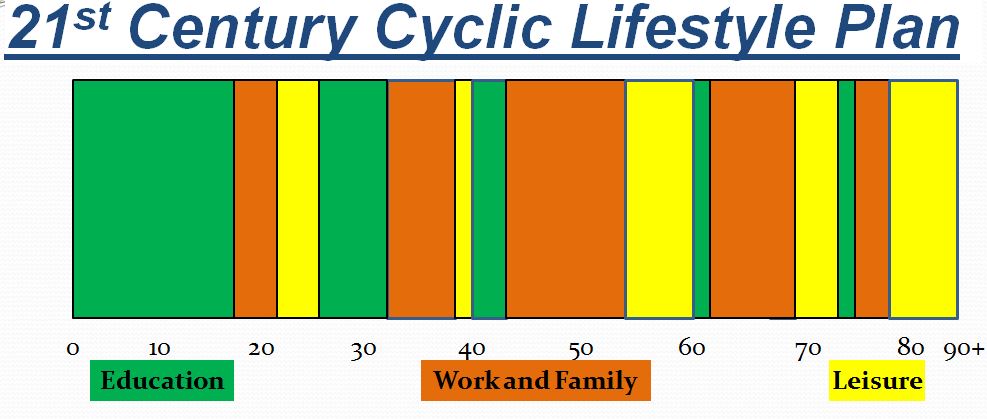How Is It OK That We’re Meant to Work a 9-5 for 40-plus Years Then Retire? Maybe We’ve Been Bamboozled!
 Did you ever wonder how we, as participants in the so-called “western culture”, ended up in a 20-40-20 linear life model while other societies, with longer life spans and generally healthier citizenry, don’t?
Did you ever wonder how we, as participants in the so-called “western culture”, ended up in a 20-40-20 linear life model while other societies, with longer life spans and generally healthier citizenry, don’t?
Somewhere along the way over the last century, somebody crafted a manual that made the default life plan to “work-from-9–5-for-40-years” and then bail out to non-work.
That makes it sound like work is bad, something to avoid.
How does it happen that we turn work into something to escape from when biological research tells us that leaving work completely is detrimental to our health? We are designed to work, to grow, to learn. Work is known to be a key component of healthy longevity. But today we seem to turn it into a nasty four-letter word that we can’t wait to get away from.
The fact is, western society has been set up this way for a very long time. It has been since the advent of the industrial revolution and our current educational system. We can easily become pawns in this system which is designed to turn us into “factory workers.” Still today we get sucked into the linear-life plan that looks like this:
A century ago, our culture started building a corporate system designed around hiring the cheapest labor possible and defining the rules by which they can function (i.e. work). The educational system moved into lockstep by dropping us into a room with 30 other pawns to teach a simple formula which marketing guru Seth Godin describes as being taught to become a “factory worker”:
“Do your job. Show up. Work hard. Listen to the boss. Stick it out. Be part of the system. You’ll be rewarded.”
But it’s changing because (1) technology has changed the formula and we have many more options and (2) we have awakened to the fact that this model pays little attention to matching innate, unique skills up with the work. This mismatch might just speak to the high level of job dissatisfaction that exists today – and to why most people can’t wait to escape into retirement.
Again, Seth Godin says it beautifully in his book “Linchpin. Are You Indispensable?”
You’ve been scammed. You traded years of your life to be part of a giant con in which you are most definitely not the winner. If you’ve been playing that game, it’s no wonder you’re frustrated. That game is over. There are no longer any great jobs where someone else tells you precisely what to do.”
We’re getting smarter – I think!
We are awakening to the fact that we have better alternatives to this model and that we can find ways to put our unique and innate talents to better and more motivating work. The old system doesn’t want our uniqueness and dreams to surface because then we aren’t likely to be compliant enough. But with the advent of technology, especially the internet, and the opportunities that abound therein, the old system has less of a hold on keeping us as factory workers.
Still, most continue to cling to the old model although the work is uninspiring and out of step with natural talents. Why? For the money and the false reality of a happy, carefree retirement and because they see only risk stepping outside that system.
Corporate life today may be the most vulnerable spot to be as our economy becomes more global and as technology accelerates the pace of disruption of entire industries. I see it week to week as I craft resumes and LinkedIn profiles for healthcare executives who have become unexpected victims of today’s corporate volatility. Many are in the twilight of their careers; few were prepared for the “transition” or have given thought to what will follow their career.
Thinking smart in the retirement years.
I remember a presentation by Dr. Ken Dychtwald, founder of the AgeWave organization in which he profiled perhaps the most sensible life model to apply to the retirement years. He calls it the:
It’s based on the simple principle of mixing education, work/family, and leisure throughout the lifespan. He makes the point that more of our young people are viewing their lives through this lens.
It also makes sense for the retirement years: moving in and out of work, learning, and leisure at the pace and frequency of your choice.
It’s a platform for a healthier third age. Safeguards against sedentary living; living with a sense of purpose; continuing to be a producer and not just a consumer; forcing present-moment living by eliminating the regrets of the past and fears of the future.
Maybe even solving a world problem or two.
Do you have a model like this? Are you spreading your life over more than just leisure living? Does your retirement plan look something like this? We’d love to know – leave us a comment below. And tell your friends about our weekly articles from www.makeagingwork.com.





I agree with your overall premise, but the 40-hour work week came about because of labor unions and ultimately productivity research by Henry Ford.
https://www.cultureamp.com/blog/40-hour-work-week-the-history-and-evolution#:~:text=1926%3A%20Henry%20Ford%20popularized%20the,a%20short%20period%20of%20time.
I just ran across a letter sent to my Great Grand father from his employer, Diamond Match Company, dated April 1955, that retirement at age 65 was mandatory. My great grandfather was born in 1882, making him 73 at the time he received the letter. He lived another 24 years before he passed away.
My observation is that it is during the mid-20th century when retirement and leisure become an objective. I wonder if social security and the availability of television had something to do with modeling the behavior you describe.
Love Dychtwald’s model, but living outside of the industrial model often can result in not being able to pay the rent. Not everyone is entrepreneurial; not everyone can find the funds to earn a credential that will lead to gainful and meaningful employment they will enjoy; not everyone has the wherewithal to progress outside of the industrial model. The good news is that things seem to be changing, exacerbated by the pandemic forcing people to rethink how they earn a living. Employer’s are increasingly realizing that it is better for their bottom lines to treat their employees more humanely, pay them a fairer wage, and support their desires for continuous improvement through more effective reskilling, upskilling, training, and education. So, hopefully we are moving away from the industrial model sooner rather than later. The challenge, really, is how does one survive financially outside of the industrial model?
I think one problem with BOTH models is that they presume that you divide your life in stretches of either 100% education, 100% work/family or 100% leisure. We should rather look at less rigid ways of dividing our lives up. E.g. work 20 hour work weeks whilst studying or leisuring (one of my friends in software development does that); then perhaps have a few years of financial capital building where you work maybe 60 hour weeks; then take a sabbatical which is 50% education; 50% leisure/family etc.
An impressive share, I just given this onto a colleague who was doing a little analysis on this. And he in fact bought me breakfast because I found it for him.. smile. So let me reword that: Thnx for the treat! But yeah Thnkx for spending the time to discuss this, I feel strongly about it and love reading more on this topic. If possible, as you become expertise, would you mind updating your blog with more details? It is highly helpful for me. Big thumb up for this blog post!
Dear makeagingwork.com admin, You always provide practical solutions and recommendations.
Hello makeagingwork.com admin, Thanks for the valuable information!
Hello makeagingwork.com webmaster, You always provide great information and insights.
To the makeagingwork.com administrator, Keep the good content coming!
Hello makeagingwork.com admin, Your posts are always informative and well-explained.
Hi makeagingwork.com admin, You always provide in-depth analysis and understanding.
To the makeagingwork.com webmaster, Your posts are always well-timed and relevant.
To the makeagingwork.com admin, Your posts are always thought-provoking and inspiring.
Hi makeagingwork.com administrator, Keep the good content coming!
Hello makeagingwork.com owner, Your posts are always on point.
Hello makeagingwork.com webmaster, Your posts are always a great read.